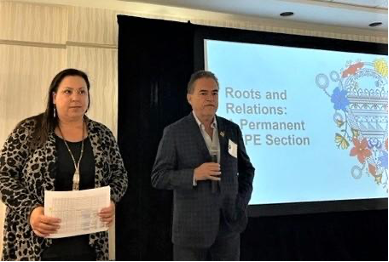
In 2021, the inclusive allies and Indigenous relatives of the Canadian Journal of Program Evaluation (CJPE) launched a permanent section called Roots and Relations (R&R). R&R is co-edited by us, Larry Bremner, FCES (Métis) and Nicole Bowman, Ph.D. (Lunaape/Mohican). Its intent is to honor our lineage, grow our kinship, and sustain intergenerational legacies of Indigenous wisdom and practices in evaluation. R&R will work to sacredly hold traditional knowledge, celebrate and make visible culture and language, protect and assert sovereignty, provide space for Indigenous voices, and celebrate Indigenous wisdom and innovations in and through the lens of evaluation. Our inaugural issue will be in the June 2023 edition of CJPE.

Visibility and valuing of Indigenous peoples, Indigenous communities (nation-to-nation), and Indigenous scholars and scholarship require deep roots, professional ethics, equitable resources, and sustainable relationships committed as kin in a liberating journey. Going beyond lip service to action through real infrastructure changes, such as the reconceptualization of peer review and making equitable resources available in publication processes, R&R has been operationally impactful thus far.
In the R&R process, an Indigenous author must be the primary submitter. All types of submissions are welcomed in the R&R “academic lodge” (e.g., journal articles, poetry, audio or video submissions, fine arts) and there is no word limit. Submitters are ranked as a seedling, sapling, adult tree, or ancestor tree as aligned on a Medicine Wheel.
Reviewers volunteer their time as part of a traditional responsibility and gifting process, and submitting authors are assigned a peer mentor or Elder to help them refine their concepts and writing. Eventually, all become authors and go through the online review process in the CJPE system with specialized R&R criteria that reflect Indigenous values and experiences. The R&R process finishes with a group of celebratory peers and Elders sharing with the author(s) the success of the journey and learning about how this work matters to them and the communities they serve.
R&R authors retain the copyright to their work, moving the ownership of the Indigenous generated publication back to the Original people(s). This honors treaty and sovereignty rights, represents an impactful data sovereignty practice, and is an ethical and professional manifestation of what it means to be a good relative. See the R&R review process graphic and webpage for more.
Raising voice and visibility for Indigenous peoples as an equitable, operational, and impactful strategic direction can be done. R&R has a trusted partnership with CJPE. We celebrate together as we define better ways of knowing, being, and doing as evaluators. It is our hope that this R&R work lasts long after us and is the start to many more western journals academic allies doing their work differently.
Hot Tip
Affiliate Yourself with Awesome Allies: CJPE Editors (Isabelle Bourgeois and Jill Chouinard), Technical Staff and Student Supports (Stephanie Maltais, the web team, and Monika Viktorin) and the CJPE National Board are awesome allies that supported the development and current activities of R&R.
Cool Trick
Rooted and Equitably Resourced Management Strategies: CJPE allies supported us conceptually, culturally, and operationally. We were given the time, human supports, and space to create, refine, and implement our processes and key documents. Our CJPE allies and R&R reviewers, peer mentors, and Elders are the best as they worked with us to co-create, critique, and celebrate our vision and are helping us make it happen for our community members and scholars.
Rad Resources
- EvalIndigenous and VOPE Toolkit
- Indigenous Peoples in Evaluation TIG
- Increasing Cultural Competence in Support of Indigenous-Led Evaluation (Wehipeihana, 2019)
- The Care Principles for Indigenous Data Governance
- First Nations Principles of Ownership, Control, Access, and Possession (OCAP)
The American Evaluation Association is hosting Indigenous Peoples in Evaluation (IPE) TIG week. All posts this week are contributed by members of the IPE Topical Interest Group. Do you have questions, concerns, kudos, or content to extend this aea365 contribution? Please add them in the comments section for this post on the aea365 webpage so that we may enrich our community of practice. Would you like to submit an aea365 Tip? Please send a note of interest to aea365@eval.org. aea365 is sponsored by the American Evaluation Association and provides a Tip-a-Day by and for evaluators. The views and opinions expressed on the AEA365 blog are solely those of the original authors and other contributors. These views and opinions do not necessarily represent those of the American Evaluation Association, and/or any/all contributors to this site.
